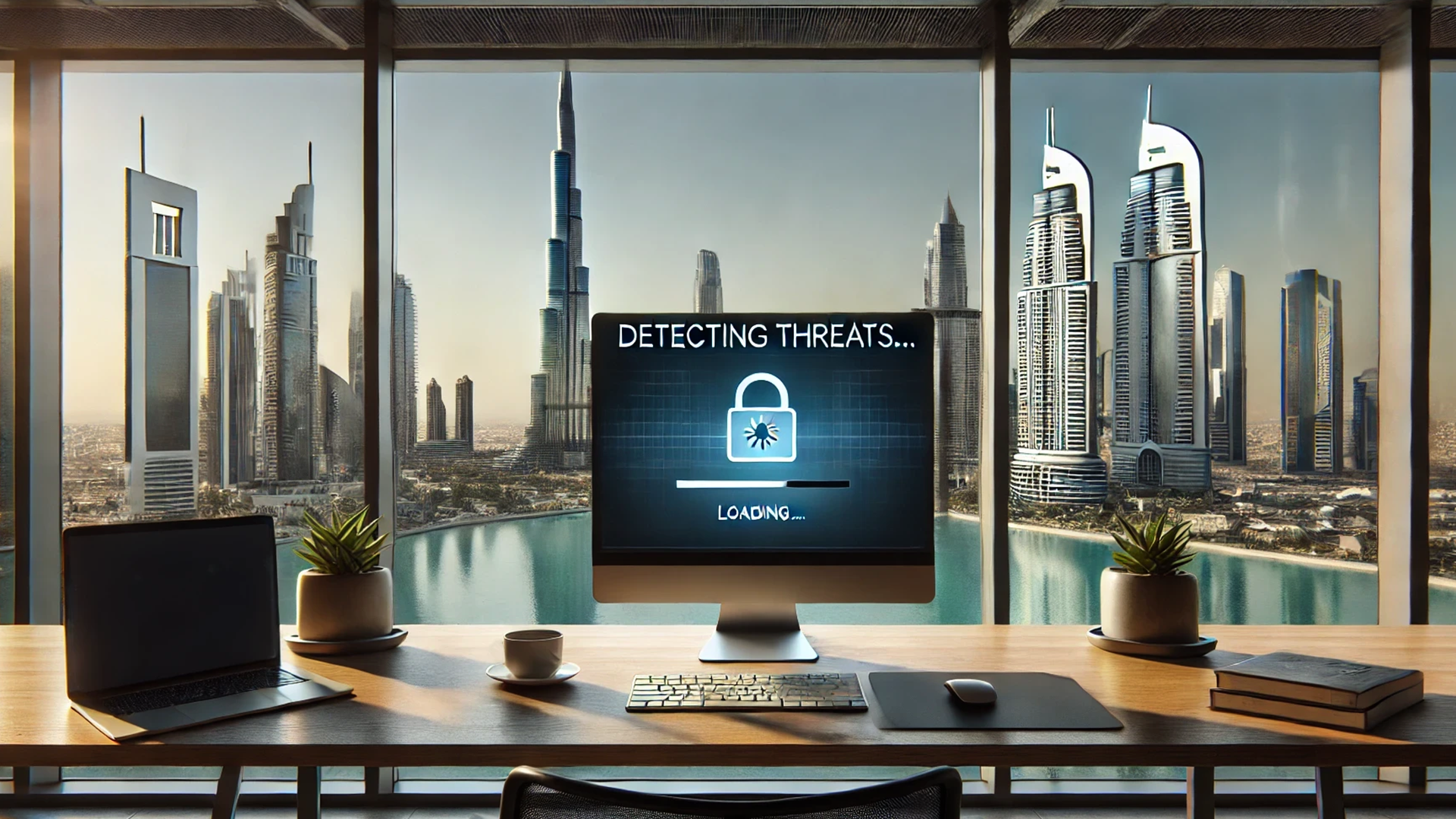
Thank you
Our team of industry domain experts combined with our guaranteed SLAs, our world class technology .


Get Immediate Help
As the UAE continues to position itself as a global leader in technology and innovation, the digital landscape in the region is evolving rapidly. With this evolution comes an increasing risk of cyber threats, making threat intelligence in the UAE more crucial than ever before. From advanced threat protection to real-time detection, businesses across the UAE are recognising the importance of integrating threat intelligence into their cybersecurity strategies to protect their assets and maintain trust with clients.
In this blog, we will explore the significance of threat intelligence in the UAE, discuss the benefits it offers, and provide insights into how organisations can leverage this critical tool to bolster their cybersecurity defences.

Threat intelligence refers to the collection, analysis, and application of information about potential or existing threats targeting an organisation. This intelligence is gathered from various sources, including open-source data, internal logs, and third-party feeds, to provide a comprehensive view of the threat landscape. The primary goal of threat intelligence is to enable proactive defence measures, helping organisations anticipate, detect, and respond to cyber threats before they can cause harm.
The UAE's strategic position as a hub for business, finance, and technology makes it a prime target for cybercriminals. The region's rapid digital transformation, coupled with its increasing reliance on connected systems, has led to a rise in sophisticated cyber threats. For businesses in the UAE, understanding and mitigating these threats is essential to maintaining operational continuity and safeguarding sensitive data.
- Growing Cyber Threats: The UAE has seen a surge in cyber attacks, including phishing, ransomware, and advanced persistent threats (APTs). Threat intelligence helps in identifying these threats early and taking preventive actions.
- Regulatory Compliance: The UAE government has implemented stringent data protection regulations, requiring businesses to have robust cybersecurity measures in place. Threat intelligence ensures compliance by providing insights into potential vulnerabilities and attack vectors.
- Business Continuity: For many organisations, a cyber attack can result in significant financial losses and reputational damage. Threat intelligence enables businesses to maintain business continuity by mitigating risks before they escalate.

Advanced threat protection is about anticipating and defending against sophisticated cyber threats that traditional security measures may miss. Threat intelligence plays a pivotal role in enhancing advanced threat protection by providing actionable insights into emerging threats and attack techniques.
How Threat Intelligence Enhances Advanced Threat Protection:
- Predictive Analysis: By analysing patterns and trends, threat intelligence can predict potential threats and suggest countermeasures.
- Real-Time Threat Detection: Integrating threat intelligence with existing security systems allows for real-time detection and response to threats.
- Security Threat Analysis: Continuous analysis of threat data helps in understanding the nature and scope of threats, enabling more effective defences.

The integration of threat intelligence into a cybersecurity strategy offers numerous benefits, particularly in a rapidly evolving cyber landscape like the UAE.
Key Benefits of Threat Intelligence in Cybersecurity:
- Proactive Defence: Threat intelligence enables businesses to stay ahead of cyber threats by identifying potential risks before they can be exploited.
- Enhanced Incident Response: Provides critical information that helps security teams respond more effectively to cyber incidents.
- Informed Decision-Making: Offers data-driven insights that support strategic decision-making in cybersecurity planning and resource allocation.
- Risk Mitigation: Helps in identifying and mitigating risks that could lead to data breaches or other security incidents.

The cybersecurity landscape in the UAE is constantly evolving, with new threats emerging as technology advances. Cyber threat detection in the region requires a multifaceted approach, combining traditional security measures with advanced threat intelligence solutions.
Current Trends in Cyber Threat Detection in the UAE:
- Increased Targeting of Critical Infrastructure: Sectors like energy, finance, and healthcare are increasingly targeted by cybercriminals. Threat intelligence helps in monitoring and protecting these critical infrastructures.
- Growing Sophistication of Attacks: Cyber attacks are becoming more sophisticated, with attackers using advanced techniques to bypass security measures. Threat intelligence provides the necessary insights to counter these advanced threats.
- Emphasis on Data Protection: With the implementation of data protection regulations, there is a growing focus on safeguarding personal and sensitive information. Threat intelligence ensures that businesses remain compliant by identifying vulnerabilities that could lead to data breaches.

For businesses in the UAE, integrating threat intelligence into their security operations is essential for building a robust cybersecurity framework. This integration involves embedding threat intelligence into various aspects of the organisation’s security posture, from incident response to daily security operations.
Steps to Integrate Threat Intelligence into Security Operations:
- Centralised Threat Intelligence Platform: Use a centralised platform to gather, analyse, and distribute threat intelligence across the organisation.
- Automation of Threat Detection: Implement automated tools that use threat intelligence to detect and respond to threats in real-time.
- Continuous Monitoring and Analysis: Regularly monitor threat landscapes and update security measures based on the latest intelligence.
- Training and Awareness: Ensure that all employees understand the importance of threat intelligence and how to apply it in their daily roles.

In a region as dynamic as the UAE, cyber defence strategies must be both proactive and adaptive. Threat intelligence is a crucial component of cyber defence, providing the necessary insights to anticipate and neutralise threats before they can cause harm.
How Threat Intelligence Enhances Cyber Defence:
- Early Warning Systems: Threat intelligence acts as an early warning system, alerting businesses to potential threats and enabling them to take preemptive actions.
- Contextual Analysis: Offers context to detected threats, helping businesses understand the potential impact and how best to mitigate them.
- Strategic Alignment: Ensures that cybersecurity strategies are aligned with the current threat landscape, making them more effective in protecting against emerging threats.

Data loss prevention (DLP) is a critical aspect of cybersecurity, particularly in the UAE where data protection regulations are stringent. Threat intelligence can significantly enhance DLP efforts by identifying potential data exfiltration methods and providing insights into how to prevent them.
How Threat Intelligence Supports Data Loss Prevention:
- Identifying Data Exfiltration Tactics: Threat intelligence can detect the methods attackers use to steal data, allowing businesses to implement specific countermeasures.
- Preventing Insider Threats: By monitoring for unusual activities, threat intelligence can help in identifying insider threats before they result in data loss.
- Strengthening DLP Policies: Provides the necessary information to refine and enhance DLP policies, ensuring they are effective against current threats.

Real-time threat detection is no longer a luxury but a necessity for businesses in the UAE. The speed at which cyber threats can evolve requires businesses to be constantly vigilant, with the ability to detect and respond to threats as they happen.
Benefits of Real-Time Threat Detection:
- Minimising Damage: By detecting threats in real time, businesses can mitigate potential damage before it escalates.
- Reducing Response Times: Real-time detection enables faster incident response, reducing the time attackers have to exploit vulnerabilities.
- Maintaining Business Continuity: Ensures that threats are neutralised quickly, allowing businesses to maintain operations without significant disruption.
At Microminder Cybersecurity, we offer a comprehensive suite of services designed to help organisations in the UAE protect themselves from cyber threats using advanced Threat Intelligence Solutions. Here’s how we can support your organisation:
- Threat Intelligence and Hunting Services: Proactively detect and analyse emerging threats to stay ahead of cybercriminals in the UAE.
- Managed Detection and Response (MDR) Services: Monitor, detect, and respond to threats in real-time to minimise damage and protect your assets.
- SOC as a Service (SOCaaS): Centralise your security operations and enhance them with expert analysis and custom reporting.
- Vulnerability Management Services: Prioritise and remediate vulnerabilities using actionable threat intelligence insights.
- Cybersecurity Consulting Services: Get strategic guidance and tailored solutions to incorporate threat intelligence into your cybersecurity strategy.
- Incident Response and Management Services: Respond quickly and effectively to security incidents, minimising their impact on your business.
- Security Awareness and Training Services: Educate and train your employees to recognise and respond to the latest threats.
- Governance, Risk, and Compliance (GRC) Services: Ensure your cybersecurity measures meet UAE regulatory standards and effectively manage risks.
By leveraging these services, your organisation can build a robust cybersecurity framework that not only protects against current threats but also adapts to future challenges in the rapidly evolving digital landscape of the UAE.
As cyber threats continue to evolve, the importance of threat intelligence in the UAE will only grow. Businesses must adopt a proactive approach to cybersecurity, integrating threat intelligence into their strategies to stay ahead of cybercriminals and protect their assets.
Ready to enhance your cybersecurity with advanced Threat Intelligence Solutions? Contact us today to learn how our comprehensive services can help you stay ahead of cyber threats and protect your critical assets. Let’s work together to build a more secure future for your business.
Don’t Let Cyber Attacks Ruin Your Business
Call
UK: +44 (0)20 3336 7200
KSA: +966 1351 81844
UAE: +971 454 01252
Contents
To keep up with innovation in IT & OT security, subscribe to our newsletter
Recent Posts
Penetration Testing | 10/11/2025
Cloud Security | 07/11/2025
Cybersecurity | 06/11/2025
Why is Threat Intelligence important for businesses in the UAE?
Threat Intelligence is crucial for businesses in the UAE because the region is a target for a wide range of cyber threats due to its economic importance and rapid digital transformation. Threat Intelligence helps businesses stay ahead of these threats, ensuring they can protect their assets, maintain operations, and comply with regulatory requirements.What are the main sources of Threat Intelligence?
Threat Intelligence can be sourced from: - Open Source Intelligence (OSINT): Information gathered from publicly available sources. - Internal Data: Logs and data generated within an organisation. - Commercial Threat Feeds: Information provided by threat intelligence vendors. - Industry Collaborations: Data shared within industry-specific groups or cybersecurity alliances.How does Threat Intelligence integrate with existing cybersecurity measures?
Threat Intelligence can be integrated with existing cybersecurity measures by: - Enhancing Real-Time Monitoring: Providing context to security alerts and helping prioritise responses. - Informing Incident Response: Offering actionable data to improve the speed and effectiveness of responses to cyber incidents. - Supporting Vulnerability Management: Identifying and prioritising vulnerabilities based on real-world threat data.What types of threats can Threat Intelligence help identify?
Threat Intelligence can help identify various types of threats, including: - Advanced Persistent Threats (APTs): Long-term, targeted attacks typically aimed at stealing data or compromising systems. - Phishing and Social Engineering: Attempts to deceive individuals into divulging sensitive information. - Malware and Ransomware: Malicious software designed to damage or gain unauthorised access to systems. - Insider Threats: Risks posed by employees or trusted individuals within an organisation.Can small and medium-sized businesses (SMBs) in the UAE benefit from Threat Intelligence?
Yes, SMBs in the UAE can benefit from Threat Intelligence by: - Gaining Early Warnings: Receiving alerts about threats that could impact their business. - Prioritising Cybersecurity Investments: Focusing resources on the most relevant threats. - Enhancing Overall Security Posture: Building a more proactive and informed approach to cybersecurity.